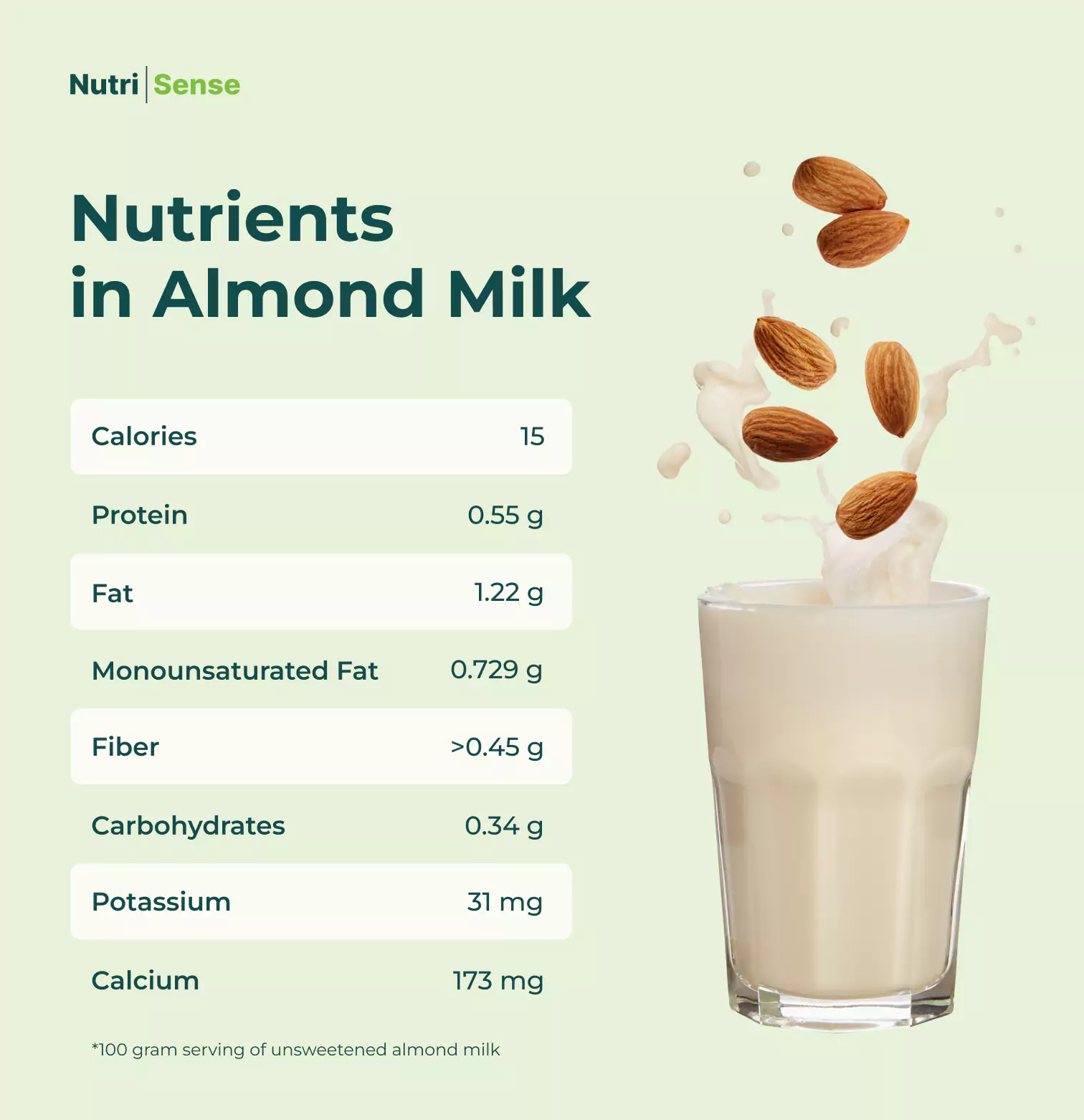Does Almond Milk Raise Your Blood Sugar?
.webp)
Key Takeaways
Almonds are a type of nut that is traditionally native to Central Asia, and are now grown around the world. These nutritious nuts are often used in baking, make great mid-day snacks or salad toppings, and are even used to make marzipan.
Mentions of almond milk can be dated back to 14th century Egypt and Europe, where it first originated as an alternative to dairy. Nowadays, however, the United States is the largest producer of almonds with California producing over 80 percent of the world’s almond supply.
So, are there any health benefits of almond milk? And how does it compare to other plant-based milk alternatives?
In this article, we’ll explore the nutritional profile of almond milk, how it affects glucose levels, and how you can make this delicious milk at home.
Different Types of Plant-Based Milks
Due to the rise of the health and wellness industry, veganism, and lactose intolerance. plant-based milk alternatives have seen a recent boom in mainstream popularity.
There are over 20 different non-dairy or plant-based milks that all vary in taste, texture, and their nutritional content. Some of the most popular alternatives to dairy products include:
Almond Milk

Almond milk is often used as a substitute for cow’s milk in everything from iced coffee to curries, creamy pasta sauces, oatmeal, smoothies, and baked goods. As almond milk is made from soaked and strained almonds, it has a distinct nutty flavor.
Almond milk is a low calorie plant-based milk alternative on the market (when unsweetened). It’s low in carbohydrates and like other varieties, it is often fortified with calcium and vitamin D.
Oat Milk
Oat milk is one of the newest plant-based milk varieties available, and has quickly become one of the most trendy and popular dairy-free milk alternatives. The velvety, smooth texture and neutral taste of oat milk make it a great choice for lattes and other beverages.
This type of milk is usually higher in carbohydrates and is generally not considered to be the most blood-glucose friendly vegan beverage. Oat milk is also a popular plant-based milk alternative for anyone who has a soy, lactose, or nut allergy.
Coconut Milk
Coconut milk, which has long been part of the traditional cuisine in Asia, is considered one of the best plant-based ingredients for curries and sauces. It also works great for making vegan versions of treats and brunch foods such as pancakes, brownies, and waffles.
This type of milk is higher in fat and calories than other alternatives and is known for its distinct coconut taste. Skimmed versions of coconut milk (which tend to contain more water), however, are often used in smoothies, overnight oats, and baked goods.
Cashew Milk

Cashew milk also has a smooth texture and works great in beverages such as hot chocolate, smoothies or smoothie bowls, or matcha lattes. As another type of nut-based plant milk, cashew milk is high in monounsaturated fat, which is known for its anti-inflammatory properties.
Cashew milk is higher in calories than almond milk, and though it contains a substantial amount of protein per serving, it falls short of soy milk. It’s commonly fortified with nutrients such as calcium.
Soy Milk
Soy milk has a creamy texture and is considered to have a milder and sweeter flavor than some of the other plant-based milks. This plant-based milk variety has the highest protein content of any milk alternative.
Similarly to other plant-based drinks, soy milk is commonly used in lattes, smoothies, and curries. However, anyone with a soy allergy should avoid this beverage and opt for another type of milk such as nut milk.
Nutritional Content of Almonds vs. Almond Milk

Almonds are a nutrient-dense food that can benefit health in a variety of ways. These nuts are a great source of healthy fats and are especially rich in monounsaturated fatty acids (or MUFAs).
Almonds are high in fiber and antioxidants such as alpha tocopherol (also known as vitamin E). These nuts are also linked to reduced risk of cardiovascular issues and support good heart health.
Research has found that regular almond consumption may help reduce high blood pressure. One study found that almond consumption over a period of 12 weeks led to lower levels of fasting blood glucose and fasting insulin as well as improved glycemic control in individuals with type 2 diabetes.
When part of a low saturated fat and high fiber diet, almond consumption has been observed to reduce LDL cholesterol. This may be connected to the MUFAs that are found in these nutrient-dense nuts.
Let’s dive deeper into the nutrients that give almonds their health benefits.
Nutrients in Almonds

One ounce of almonds (two handfuls or about 28 grams) contains:
- 164 calories
- 6.01 grams of protein
- 14.1 grams of total fat, of which 8.96 grams are from monounsaturated fats
- 3.54 grams of fiber
- 6.12 grams of carbohydrates
- 208 mg of potassium
- 76.3 mg of calcium
Nutrients in Almond Milk
Almond milk is produced from two main ingredients: almonds and water. Since almond milk is diluted with water, the nutrient content of this drink varies from the nuts themselves.
Almond milk found in grocery stores often contains very few almonds, and may have additives that are not well tolerated by some people. Opting for an organic brand or one with as few ingredients as possible is the best way to avoid consuming these additives.

A 100 gram serving of unsweetened almond milk contains:
- 15 calories
- 0.55 grams of protein
- 1.22 grams of fat, 0.729 grams of which is monounsaturated fats
- Less than 0.45 grams of fiber
- 0.34 grams of carbohydrates
- 31 mg of potassium
- 173 mg of calcium
Is Almond Milk Good for Blood Glucose Levels?

Almond milk is low in carbohydrates and has a glycemic index (GI) of about 57, making it a medium GI beverage. However, the GI of almond milk may vary depending on the brand and the amount of sugar added.
While almond milk is low in carbs, it is also relatively low in protein, fiber, and healthy fats. These nutrients all play an important role in stabilizing blood sugar levels. This may be why some people can still experience blood sugar spikes when consuming almond milk without adequate amounts of protein, fiber, and healthy fats.
Because almond milk differs slightly in the GI and nutritional content based on brand, the best way to determine how your body responds to almond milk is to test your blood glucose levels using a continuous glucose monitor (or CGM). Opting for an unsweetened almond milk is the best choice for avoiding glucose spikes.
How to Find Healthy Almond Milk at Your Grocery Store
Some people have trouble digesting almond milk (and many other foods) due to the presence of stabilizers like carrageenan. This agent can affect digestion in some individuals, which may manifest as GI symptoms such as abdominal discomfort or pain and gas.
Here are some tips to find healthy, glucose-friendly almond milk at your local grocery or health food store:
- Always read the nutrition label and opt for brands with simple and minimal ingredients such as almonds, water, and little to no additives.
- Look for almond milk in the refrigerated section of your grocery store, they may be less likely to have excessive amounts of stabilizers.
How to Make Almond Milk at Home

Alternatively, you can easily make almond milk at home if you want to avoid any of the extra additives added into popular brands. Making this drink at home also eliminates the need for stabilizers or gums that makes this beverage difficult to digest for some.
Here’s an easy recipe you can make at home that uses only almonds and water. Just make sure to consume this beverage within a couple of days!
Better Than Store-Bought Almond Milk by Detoxinista
Ingredients
- 1 cup almonds, soaked in water for four to six hours
- 4 cups filtered water
Making this recipe is as easy as blending the two ingredients together in a high-speed blender, and then straining out the pulp using a cheesecloth. What you’ll have left is a cream-colored beverage that’s perfect for your morning coffee.
Find the right Nutrisense programto turn insight into progress.
Go Beyond Glucose Data with Nutrisense
Your glucose can significantly impact how your body feels and functions. That’s why stable levels are an important factor in supporting overall wellbeing. But viewing glucose isn't enough. Nutrisense, you’ll be able to learn how to use your body's data to make informed lifestyle choices that support healthy living.
One-to-one coaching
Sign up to access insurance-covered video calls to work with a glucose expert: a personal registered dietitian or certified nutritionist who will help tailor your lifestyle and diet to your goals.
Monitor and measure what matters
With the Nutrisense CGM Program, you can monitor your glucose with health tech like glucose biosensors and continuous glucose monitor (CGM)s, and analyze the trends over time with the Nutrisense App. This will help you make the most informed choices about the foods you consume and their impact on your health.
Find your best fit
Ready to take the first step? Start with our quiz to find the right Nutrisense program to help you take control.

Heather is a Registered and Licensed Dietitian Nutritionist (RDN, LDN), subject matter expert, and technical writer, with a master's degree in nutrition science from Bastyr University. She has a specialty in neuroendocrinology and has been working in the field of nutrition—including nutrition research, education, medical writing, and clinical integrative and functional nutrition—for over 15 years.




